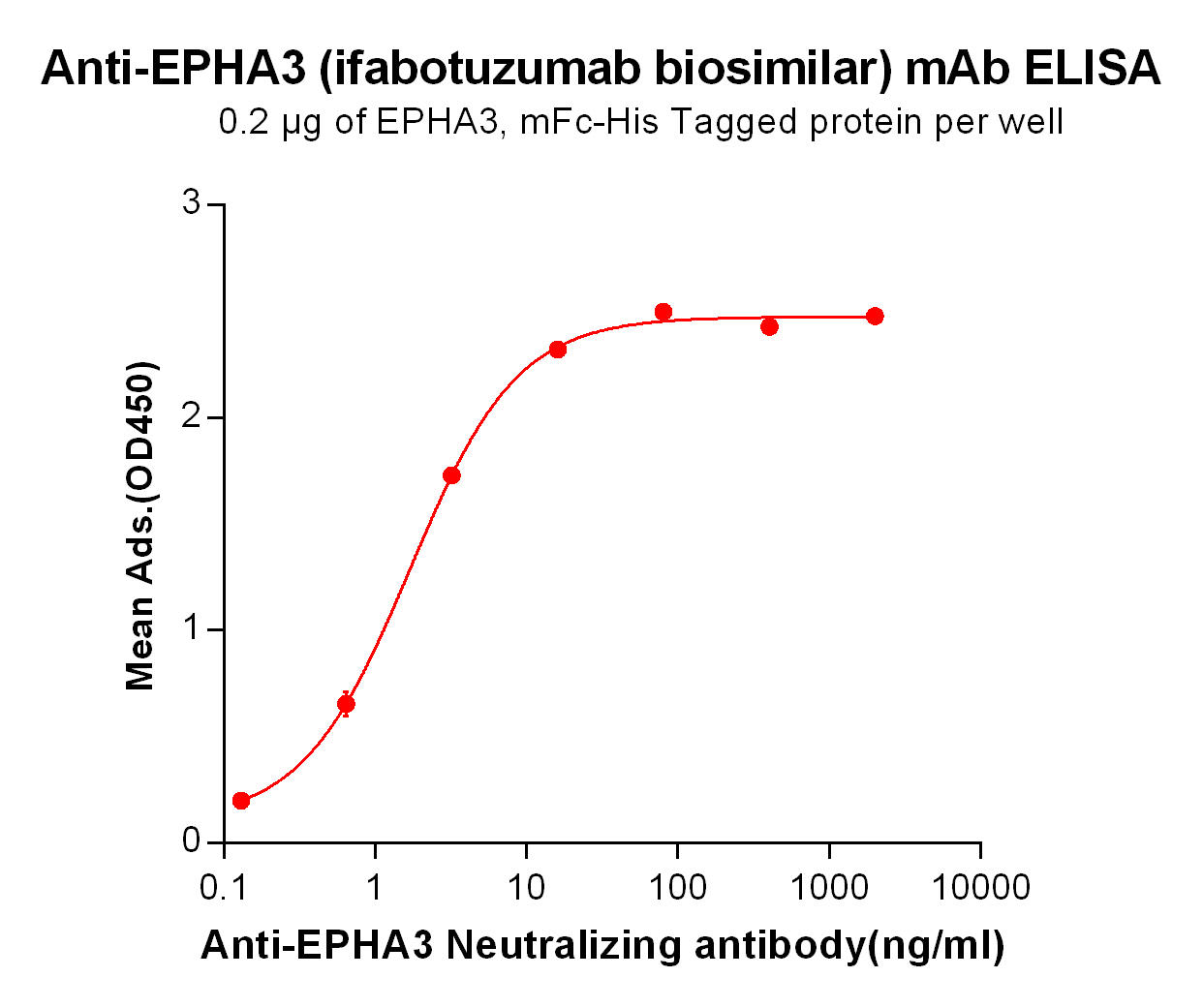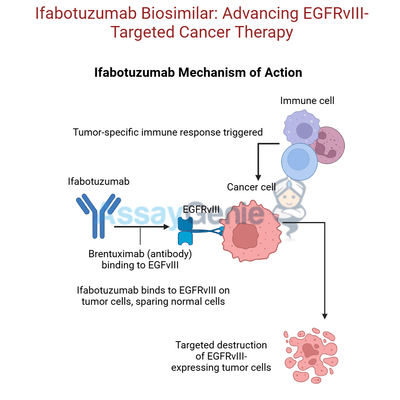Ifabotuzumab: Exploring the Role of Anti-EphA3 in Cancer Research
What You Need to Know About Ifabotuzumab
What is Ifabotuzumab?
Ifabotuzumab is a monoclonal antibody targeting EphA3, a receptor tyrosine kinase overexpressed in certain cancers. It plays a critical role in tumor angiogenesis and microenvironment regulation.
What is the mechanism of action for Ifabotuzumab?
Ifabotuzumab binds to EphA3, disrupting tumor-supportive interactions and potentially reducing tumor growth and spread.
What are the clinical applications of Ifabotuzumab?
This antibody is being studied for its therapeutic potential in treating various cancers, including glioblastoma and solid tumors.
1.) Understanding Ifabotuzumab
Ifabotuzumab is a humanized monoclonal antibody designed to target the EphA3 receptor, a protein highly expressed in the tumor vasculature and cancer-associated stromal cells. Unlike many other therapeutic targets, EphA3 is minimally expressed in normal adult tissues, making it an ideal focus for cancer therapies. Its involvement in tumor progression and angiogenesis positions it as a critical component in the development of aggressive cancers, including glioblastoma.
Research into Ifabotuzumab is ongoing, with early findings indicating its potential to disrupt the tumor microenvironment and enhance patient outcomes. The antibody works by binding specifically to EphA3 on cancer cells and associated stromal elements, triggering immune-mediated mechanisms that lead to the destruction of these malignant components. This immune activation not only directly targets cancer cells but also disrupts the tumor's support structures, such as its blood vessels and stromal network. By interfering with the tumor microenvironment, Ifabotuzumab may reduce the cancer's ability to grow and spread.
Particularly in glioblastoma, a cancer characterized by its highly invasive nature and resistance to conventional treatments, Ifabotuzumab’s dual mechanism of targeting both tumor cells and their supportive environment holds promise. Its ability to alter the stromal architecture and impair angiogenesis could significantly weaken the tumor’s ability to sustain itself.
As clinical studies progress, Ifabotuzumab continues to generate interest as a novel therapeutic strategy. By addressing both the cancer cells and the critical infrastructure supporting them, it represents an innovative approach in the ongoing battle against aggressive malignancies.
Prefer to Listen? Check out the Ifabotuzumab Podcast Episode
2.) Mechanism of Action of Ifabotuzumab
Ifabotuzumab operates through a targeted approach, focusing on the EphA3 receptors abundantly expressed in tumor cells and the surrounding stromal tissue. These receptors, minimally present in normal adult tissues, play a pivotal role in supporting tumor progression and angiogenesis, making them a key therapeutic target. Upon binding to EphA3, Ifabotuzumab initiates antibody-dependent cellular cytotoxicity (ADCC), a process that recruits immune cells, such as natural killer (NK) cells and macrophages, to the tumor site. These immune cells then destroy the cancer cells and stromal elements marked by Ifabotuzumab, effectively reducing tumor viability.
In addition to its ADCC-mediated effects, Ifabotuzumab disrupts EphA3 signaling pathways. This interference hinders the formation and maintenance of tumor vasculature, a vital lifeline for cancer cells that provides nutrients and oxygen while facilitating the removal of waste products. By impairing angiogenesis, Ifabotuzumab starves the tumor of essential resources, thereby limiting its growth and ability to metastasize.
Emerging research suggests that Ifabotuzumab holds significant potential when used in combination therapies. By targeting the tumor microenvironment and vasculature, it may create conditions that enhance the effectiveness of other cancer treatments, such as chemotherapy, radiation, or immune checkpoint inhibitors. This synergistic potential positions Ifabotuzumab as a promising component of integrated cancer treatment regimens, particularly for aggressive and treatment-resistant cancers like glioblastoma.
As ongoing studies delve deeper into its mechanisms and clinical applications, Ifabotuzumab continues to stand out as a novel and versatile weapon in the fight against cancer.

3.) Clinical Applications of Ifabotuzumab
Ifabotuzumab is being actively investigated for its potential in treating cancers characterized by high EphA3 expression, a hallmark of aggressive and treatment-resistant malignancies. This innovative monoclonal antibody holds promise as a targeted therapeutic option, with its unique mechanism of action making it particularly suitable for disrupting tumor growth and angiogenesis.
One of the primary areas of focus for Ifabotuzumab is glioblastoma, an aggressive and notoriously difficult-to-treat brain tumor. Early preclinical studies and phase I clinical trials have shown encouraging results, with Ifabotuzumab demonstrating an ability to alter the tumor microenvironment and impair critical support structures like vasculature and stromal networks. These effects could significantly improve treatment outcomes for glioblastoma patients, a population with limited therapeutic options.
Beyond glioblastoma, research is exploring Ifabotuzumab’s potential in treating a range of solid tumors, including those of the lung, breast, and prostate. The overexpression of EphA3 in these cancers suggests that Ifabotuzumab could have broad applicability. By targeting this receptor, it may effectively weaken tumors by disrupting both the cancer cells and their supportive stroma, which play a critical role in tumor growth and metastasis.
While clinical trials are still ongoing, Ifabotuzumab’s novel approach has generated significant interest in the oncology community. Its ability to target both cancer cells and the tumor microenvironment positions it as a potential cornerstone in the future of targeted cancer therapy, particularly when integrated into combination treatment regimens.
4.) Advancing Research on Ifabotuzumab
What is a Biosimilar?
Biosimilars are biologic products designed to be highly similar to an already approved reference biologic. They offer a cost-effective alternative while maintaining the same efficacy and safety profile, particularly in research settings.

| Ifabotuzumab (Anti-EPHA3) Biosimilar Antibody | |
|---|---|
| Antibody Type: | Monoclonal Antibody |
| Protein: | EPHA3 |
| Reactivity: | Human |
How Does Ifabotuzumab Biosimilar Compare?
Our Ifabotuzumab biosimilar is a research-use-only product designed to facilitate advancements in understanding EphA3's role in cancer. While not identical to the original antibody, it provides comparable performance for preclinical studies and exploratory research.
Benefits of Ifabotuzumab Biosimilar
Note: The Ifabotuzumab biosimilar is intended for research use only and is not suitable for clinical or therapeutic applications.
Discover Our Biosimilar Range
At Assay Genie, we specialize in providing high-quality biosimilars for research use! Check out our full biosimilar range to learn more.

By Chris McNally, PhD
Chris McNally, PhD, has a strong foundation in Biomedical Science, completing a PhD scholarship in collaboration with Randox Laboratories and Ulster University. Chris has published extensively in prostate cancer research, focusing on biomarker discovery, cancer risk stratification, and molecular mechanisms such as hypoxia-induced regulation. He currently serves as a Business Development Manager at Assay Genie.
Recent Posts
-
Metabolic Exhaustion: How Mitochondrial Dysfunction Sabotages CAR-T Cell Therapy in Solid Tumors
Imagine engineering a patient's own immune cells into precision-guided missiles against cancer—cells …8th Dec 2025 -
The Powerhouse of Immunity: How Mitochondrial Fitness Fuels the Fight Against Cancer
Why do powerful cancer immunotherapies work wonders for some patients but fail for others? The answe …5th Dec 2025 -
How Cancer Cells Hijack Immune Defenses Through Mitochondrial Transfer
Imagine a battlefield where the enemy doesn't just hide from soldiers—it actively sabotages their we …5th Dec 2025




